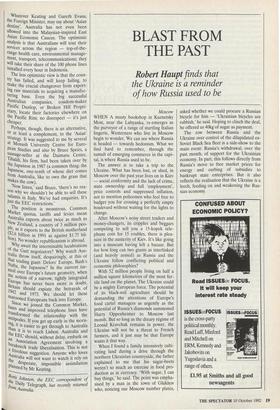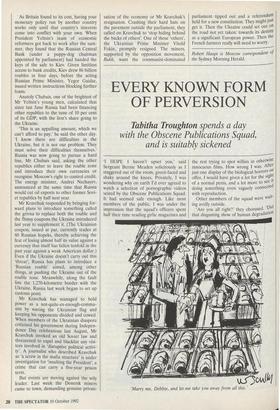BLAST FROM THE PAST
Robert Haupt finds that the Ukraine is a reminder of how Russia used to be
Moscow WHEN A musty bookshop in Kuznetsky Most, near the Lubyanka, re-emerges as the purveyor of a range of startling Italian lingerie, Westerners who live in Moscow begin to wonder. We can see where Russia is headed — towards hedonism. What we find hard to remember, through the tumult of emerging commerce in the capi- tal, is where Russia used to be.
The answer is to take a trip to the Ukraine. What has been lost, or shed, in Moscow over the past year lives on in Kiev — social conformity and the lack of crime, state ownership and full 'employment', price controls and suppressed inflation, not to mention policemen who feel free to badger you for crossing a perfectly empty boulevard without waiting for the lights to change.
After Moscow's noisy street traders and money-changeis, its cripples and beggars competing to sell you a 15-kopek tele- phone coin for 15 roubles, there is plea- sure in the austerity of Kiev. It's like going into a museum having left a bazaar. But for how long can two giants as interlinked (and heavily armed) as Russia and the Ukraine follow conflicting political and economic philosophies?
With 52 million people living on half a million square kilometres of the most fer- tile land on the planet, The Ukraine could be a mighty European force. The potential of its black-soil agriculture should be demanding the attentions of Europe's food cartel managers as urgently as the potential of Russia's diamonds summoned Harry Oppenheimer to Moscow last month. But so long as the dreary regime of Leonid Kravchuk remains in power, the Ukraine will not be a threat to French farmers, and it just may be that Europe wants it that way.
When I found a family intensively culti- vating land during a drive through the northern Ukrainian countryside, the father explained to me that his sugar-beets weren't so much an exercise in food pro- duction as in currency. 'With sugar, I can buy things,' he said. The point was empha- sised by a man in the town of Glukhov who, noticing our Moscow number plates, asked whether we could procure a Russian bicycle for him — 'Ukrainian bicycles are rubbish,' he said. Hoping to clinch the deal, he offered us 40kg of sugar as payment.
The row between Russia and the Ukraine over control of the dilapidated ex- Soviet Black Sea fleet is a side-show to the main event: Russia's withdrawal, over the past month, of support for the Ukrainian economy. In part, this follows directly from Russia's move to free market prices for energy and curbing of subsidies to bankrupt state enterprises. But it also reflects the realisation that the Ukraine is a leech, feeding on and weakening the Rus- sian economy. As Britain found to its cost, having your monetary policy run by another country works only until that country's interests come into conflict with your own. When President Yeltsin's team of economic reformers got back to work after the sum- mer, they found that the Russian Central Bank (under a puppy-dog chairman appointed by parliament) had handed the keys of the safe to Kiev. Given limitless access to bank credits, Kiev drew 86 billion roubles in four days, before the acting Russian Prime Minister, Yegor Gaidar, issued written instructions blocking further loans.
Anatoly Chubais, one of the brightest of Mr Yeltsin's young men, calculated that since last June Russia had been financing other republics to the tune of 10 per cent of its GDP, with the lion's share going to the Ukraine.
`This is an appalling amount, which we can't afford to pay,' he said the other day. I know there are difficulties in the Ukraine, but it is not our problem. They must solve their difficulties themselves.' Russia was now going to pursue a hard line, Mr Chubais said, asking the other republics either to leave the rouble zone and introduce their own currencies or recognise Moscow's right to control credit. The energy minister, Andrei Nechayev, announced at the same time that Russia would cut oil exports to other former Sovi- et republics by half next year.
Mr Kravchuk responded by bringing for- ward plans to introduce something called the grivna to replace both the rouble and the flimsy coupons the Ukraine introduced last year to supplement it. (The Ukrainian coupon, issued at par, currently trades at 60 Russian kopeks, thereby achieving the feat of losing almost half its value against a currency that itself has fallen tenfold in the past year against a weak American dollar.) Even if the Ukraine doesn't carry out this `threat', Russia has plans to introduce a `Russian rouble' aimed, among other things, at pushing the Ukraine out of the rouble zone. Meanwhile, along the fault line the 1,270-kilometre border with the Ukraine, Russia last week began to set up customs posts.
Mr Kravchuk has managed to hold power as a not-quite-ex-enough-commu- nist by waving the Ukrainian flag and keeping his opponents divided and cowed. When members of the Ukrainian diaspora criticised his government during Indepen- dence Day celebrations last August, Mr Kravchuk invoked an old Soviet law and threatened to expel and blacklist any visi- tors involved in 'disruptive political activi- ty'. A journalist who described Kravchuk as 'a screw in the mafia structure' is under investigation for 'insulting the President', a crime that can carry a five-year prison term.
But events are moving against the wily leader. Last week the Donetsk miners came to town, demanding genuine privati- sation of the economy or Mr Kravchuk's resignation. Crashing their hard hats on the pavement outside the parliament, they called on Kravchuk to 'stop hiding behind the backs of others'. One of those 'others', the Ukrainian Prime Minister Vitold Fokin, promptly resigned. The miners, supported by the opposition movement, Rukh, want the communist-dominated
parliament tipped out and a referendum held for a new constitution. They might just get it. Then the Ukraine could set out on the road not yet taken: towards its destiny as a significant European power. Then the French farmers really will need to worry.
Robert Haupt is Moscow correspondent of the Sydney Morning Herald.



























































 Previous page
Previous page